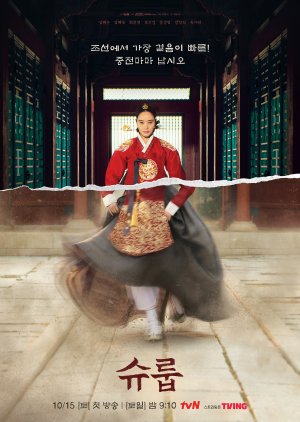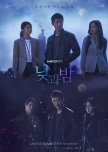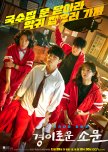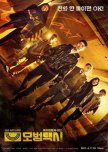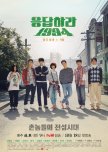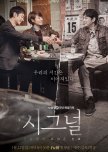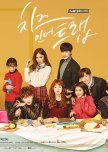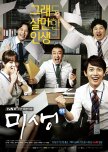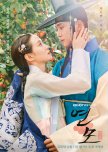
If you like historical dramas where the royals hide secrets and a romantic love story between the main characters, this would be of interest.
The queen in both dramas plays a part in coordinating the chaos in the palace.
Both dramas have a good sense of humor.
The queen in both dramas plays a part in coordinating the chaos in the palace.
Both dramas have a good sense of humor.
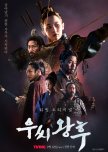
Both dramas are historical, of course 'Under the Queen's Umbrella,' is not based on any one particular queen...it's just based more on the treacherous living within the palace walls and how one Queen navigates every situation meant to bring her down as the Queen, as well as her children. Both Queen Woo and the Queen in 'Under the Queen's Umbrella,' showcases very savvy and tough women...women who are at the mercy of the men that make the rules, and finding ways around them and all the scheming and plotting, in order to hold onto their place, and the place of the men (the King's) they love.
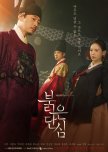
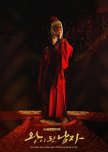
Similarities:
- people wanting to dethrone a royalty
- evil Queen Dowager & state councilor
- strong friendship between a royalty and a subject
- less focus on romance
- engaging story line
- excellent performance of the actors
Differences:
- the story
The Crowned Prince (TCC) is that first sageuk that made me interested in watching such dramas. I usually watch sageuk dramas just to pass time but most do not hold a candle to TCC. (BTW I do not consider Alchemy of Souls as a sageuk drama because it has fantasy elements.) Now, after watching the 4 episodes from Under The Umbrella, I would say TCC has competition.
- people wanting to dethrone a royalty
- evil Queen Dowager & state councilor
- strong friendship between a royalty and a subject
- less focus on romance
- engaging story line
- excellent performance of the actors
Differences:
- the story
The Crowned Prince (TCC) is that first sageuk that made me interested in watching such dramas. I usually watch sageuk dramas just to pass time but most do not hold a candle to TCC. (BTW I do not consider Alchemy of Souls as a sageuk drama because it has fantasy elements.) Now, after watching the 4 episodes from Under The Umbrella, I would say TCC has competition.
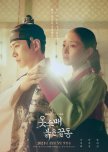
Both dramas has an interesting love story (different but good).
If you like historical dramas where the Prince tries to correct past mistakes from their fathers (former king), you would like this.
The main female lead are both strong and independent - kind-hearted personalities.
The main male lead are both super hard working and smart. They are admired and respected by their people.
If you like historical dramas where the Prince tries to correct past mistakes from their fathers (former king), you would like this.
The main female lead are both strong and independent - kind-hearted personalities.
The main male lead are both super hard working and smart. They are admired and respected by their people.
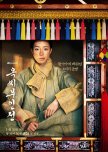

Haechi and Under the Queen's Umbrella are both Korean historical dramas whose plot revolves around the fight for succession among the king's sons and an overlooked prince's unlikely climb to the position of crown prince.
That said, in Haechi the person who eventually becomes the crown prince is the protagonist of the drama, whereas in Under the Queen's Umbrella the main character is actually his mother. For that reason, the dramas emphasise different aspects of the selection process. Also, in Haechi the crown prince arc is only one part of the story, which follows the protagonist into his reign as king, whereas in UQU I think the crown prince selection will take up the majority of the narrative.
That said, if you like the intrigues and plotting in either drama, you may enjoy that aspect of the other.
That said, in Haechi the person who eventually becomes the crown prince is the protagonist of the drama, whereas in Under the Queen's Umbrella the main character is actually his mother. For that reason, the dramas emphasise different aspects of the selection process. Also, in Haechi the crown prince arc is only one part of the story, which follows the protagonist into his reign as king, whereas in UQU I think the crown prince selection will take up the majority of the narrative.
That said, if you like the intrigues and plotting in either drama, you may enjoy that aspect of the other.
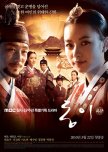
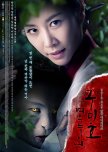
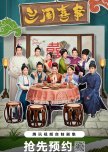
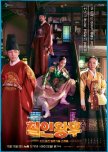
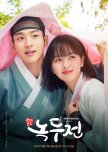
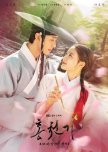
During the Joseon Dynasty, a young woman named Hong Chun Ki is a painter – a true rarity in Joseon Korea, where Confucian values dictate that such pursuits are unsuitable for a woman. She was born blind but somehow managed to acquire a sense of vision. And now she has been accepted to the most prestigious art college in the land. One day, she meets Ha Ram, an astrologer whose fate is the polar opposite of her own: Although he was born sighted, he lost his vision in a childhood accident. Regardless, he is also in possession of an astounding talent that allows him to read the future by tracing the movement of the sky at night despite the fact that he is blind. The duo is sucked into the machinations of the royal court, particularly those involving two princes, the free-spirited Prince Yang Myung and the cruel, scheming Prince Joo Hyang – a man who longs to become the next Joseon king.
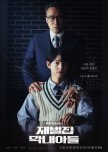
Both:
- historical fiction (one set in Joseon, the other encompasses late 80s to present time)
- a drama about POWER acquisition, revenge and the seek for truth
- not focused on romance but there are love lines and not everyone was thrilled for that part of the story
- great performance from veteran actors (Kim Hyesoo and Lee Sungmin)
- historical fiction (one set in Joseon, the other encompasses late 80s to present time)
- a drama about POWER acquisition, revenge and the seek for truth
- not focused on romance but there are love lines and not everyone was thrilled for that part of the story
- great performance from veteran actors (Kim Hyesoo and Lee Sungmin)
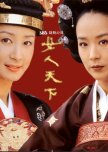
Both featuring badass and acomplished 80s actresses - Jeon In Hwa and Kim Hye Soo respectively - as badass queens controlling the court at the tip of their fingers while protecting their bloodline's life and throne rights. LOTP is more authentic in terms of speech and happenings, as it follows the life of a real person that lived, and is 150 episodes long, while UTQU is on a more dramaticised and fictional storyline.

